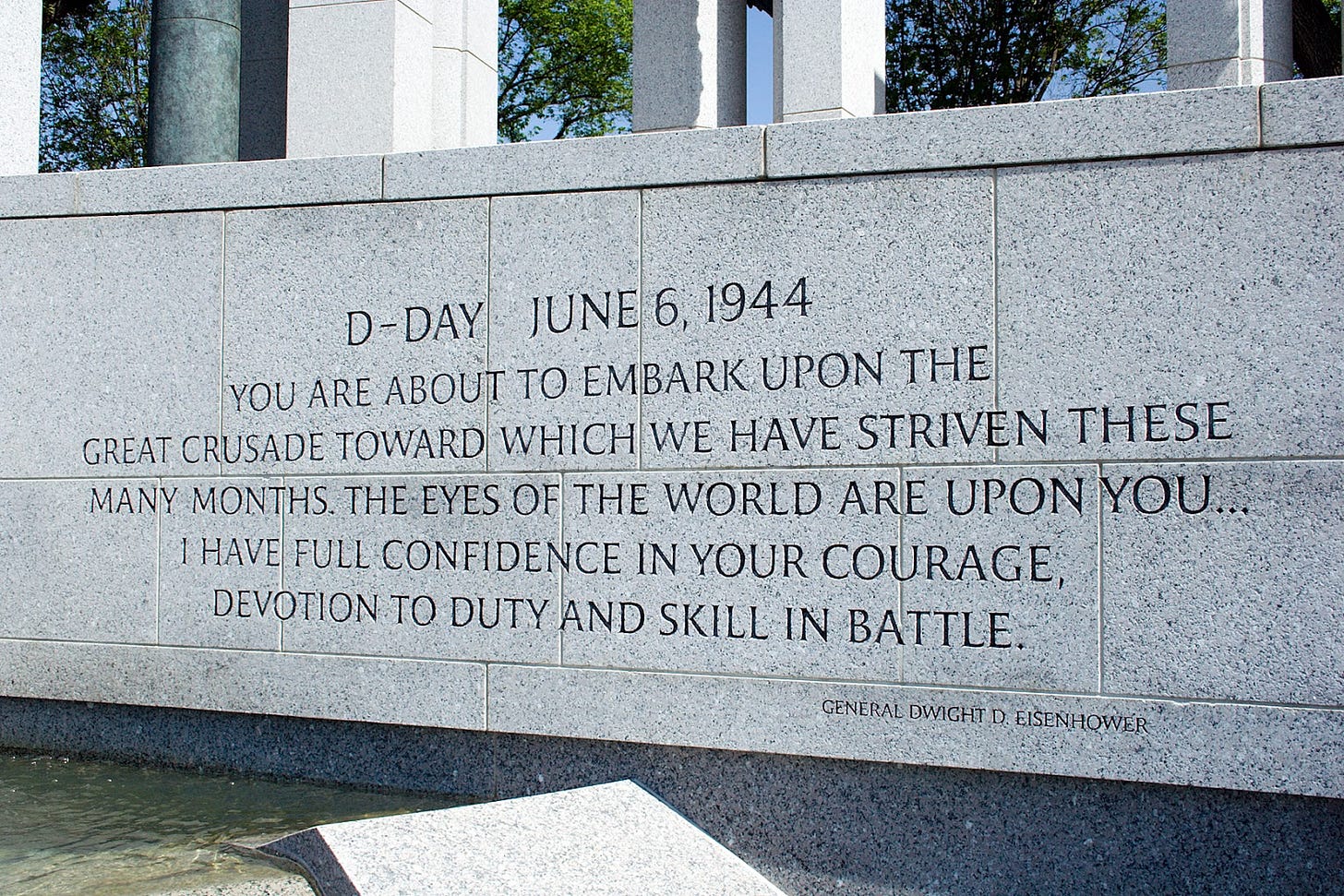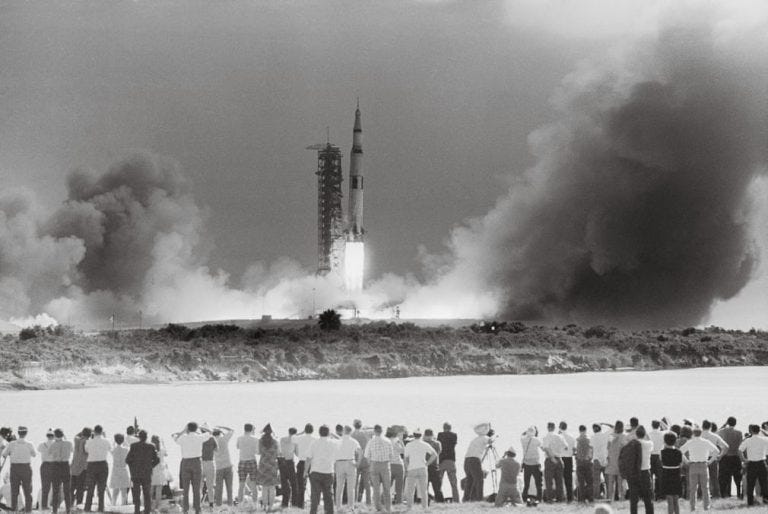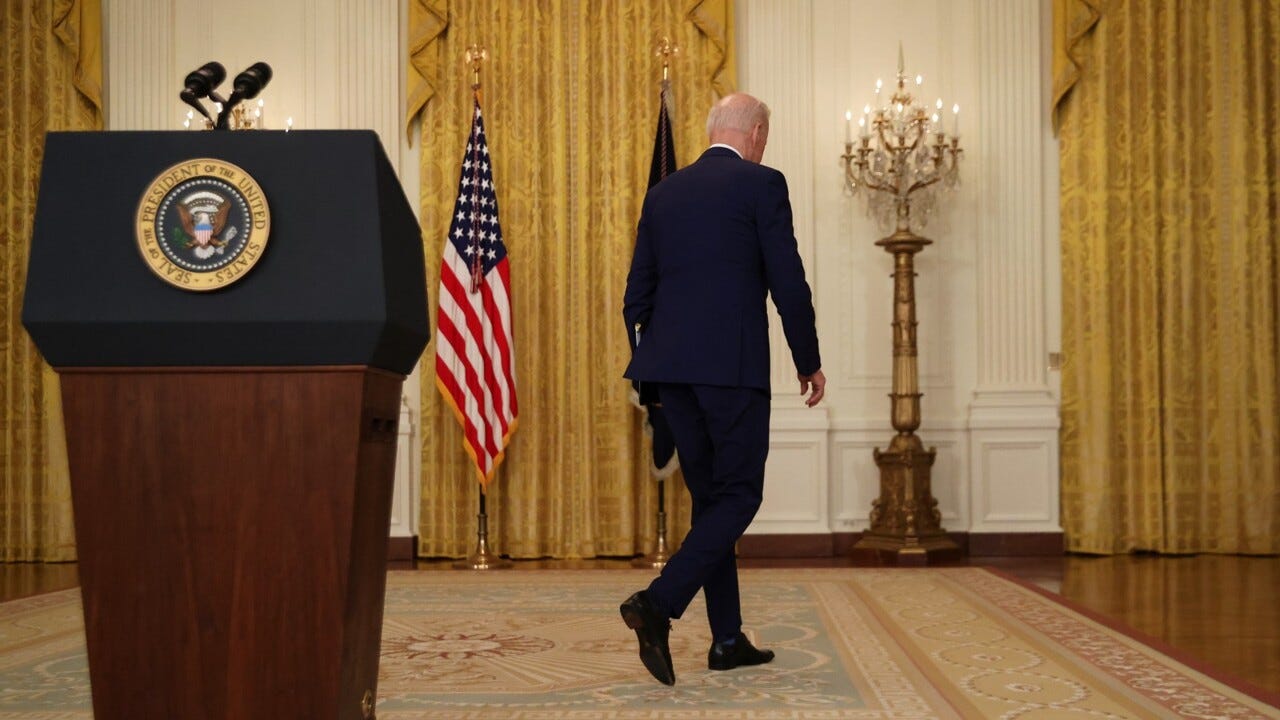"At the moment of truth, there are either reasons or results."
—Chuck Yeager
On July 16, 1969, the Apollo 11 spaceflight took off from the Kennedy Space Center on the Saturn V rocket. The overwhelming burst of fire and billowing smoke embodied the unyielding challenge that President John F. Kennedy issued eight years earlier on May 25, 1961, of “landing a man on the Moon and returning him safely to the Earth. No single space project in this period will be more impressive to mankind, or more important for the long-range exploration of space; and none will be so difficult or expensive to accomplish.”
Four days later on July 20, Commander Neil Armstrong and lunar module pilot Edwin “Buzz” Aldrin landed on the moon while a nation watched, and breathlessly waited. An estimated 650 million people watched the American astronauts through NASA transmission and listened to President Richard Nixon talk to the men. It was an epical event — one that changed the trajectory of history and opened the possibilities of man’s imagination as reality like never before. But one piece of the story remains locked in the annals of an alternate ending, one in which the nation that came together in elated unity and national pride would have shaken the confidence of the superpower in the grips of a war for freedom against a formidable enemy. William Safire, who was building a reputation for his culture-war criticisms writing speeches for Vice President Spiro Agnew, was given a novel and gravely serious task: penning an address to the nation — a eulogy — to be read by Nixon in the event the Apollo 11 mission failed in its ascent from the moon, effectively entombing the astronauts in the dark expanse of space.
In their exploration, they stirred the people of the world to feel as one; in their sacrifice, they bind more tightly the brotherhood of man.
In ancient days, men looked at stars and saw their heroes in the constellations. In modern times, we do much the same, but our heroes are epic men of flesh and blood.
Others will follow, and surely find their way home. Man's search will not be denied. But these men were the first, and they will remain the foremost in our hearts.
For every human being who looks up at the moon in the nights to come will know that there is some corner of another world that is forever mankind.
This disastrous end to the moon landing has vestiges of another pivotal, world-altering event: D-Day. Even after months of planning, choreography, international collaboration, and the deaths of hundreds of men in training for the massive beachhead landing in France, couldn’t make up for the massive gamble that was about to take place in the early morning hours of June 6, 1944. The outcome could shift the tide to insurmountable momentum for either side toward victory.

A good leader has to be prepared to continue along a path toward victory in the wake of triumph and defeat. A great leader understands where his responsibility lies in the affairs of men, of war, of uncertainty and fear, and in failure. General Dwight D. Eisenhower was fully aware of the magnitude of the events before him, his country, and the world, and in the quiet of the night on a simple notepad, prepared his declaration as fresh-faced boys — barely men made their way through the churning waters of the English Channel towards the fate of the free world:
Our landings in the Cherbourg-Havre area have failed to gain a satisfactory foothold and I have withdrawn the troops. My decision to attack at this time and place was based upon the best information available. The troops, the air and the Navy did all that bravery and devotion to duty could do. If any blame or fault attaches to the attempt it is mine alone.
America has fallen into the grips of many challenges that have seemed insurmountable from the Revolutionary War, the taming of the West, and cultural and political upheavals of the 1960s, to the Cold War and beyond. It is a tribute to the character of the people and the strength of will of succeeding generations that have seen the nation continue to press on and grow more cognizant of its abilities but not limited in its potential. But it should not be understated how the role and approach of our leaders have harnessed or hindered this great unspoken power.
What about the times when America did fail? When our leaders misjudged their own abilities, tactical planning, and even competency? We’ve grown accustomed to word-salad dodging, deflection, finger-pointing, and “C’mon, man” smug reactions from grown men and women who missed the Moral Obligation class in grade school. So it’s jarring when looking at two situations — the Bay of Pigs invasion during the Kennedy administration and the shooting down of an American U-2 spy plane in Soviet territory under Eisenhower — that resemble events happening in 2023 and see the enormous difference between the actions and reaction of leaders then and now.
Both Kennedy and Eisenhower had to suffer the arrows of public humiliation in the midst of a cold war already at the forefront of Americans’ minds. But their humble acceptance of culpability, public posturing, and framing of both incidents not only saved their reputations (and in the case of Kennedy, actually gave a boost to his public approval ratings) but helped galvanize Americans against the communist threat with Gallup polling also showing national support for a trade embargo against Cuba and the Castro regime. What these two leaders, born of different generations and facing a vastly different world than the ones in which they came of age and power, had was a sense of moral obligation to the people who they served and to whom they were accountable. The buck stopped with them.
In his radio address to the nation, later reiterated in a press release and subsequent news conference, Eisenhower declared, “I take full responsibility for approving all the various programs undertaken by our government to secure and evaluate military intelligence.”
In the wake of the Bay of Pigs, Kennedy, taking cues from his predecessor and Eisenhower’s belief in the importance of being in control of one’s administration and messaging, issued the following statement:
President Kennedy has stated from the beginning that as president he bears sole responsibility for the events of the past few days. He has stated it on all occasions & he restates it now so that it will be understood by all. The President is strongly opposed to anyone within or without the administration attempting to shift responsibility.
Both men framed these separate events as necessary for the defense of the nation. They were bold, determined, and clear. They owed the American people answers, respect, and honesty. There was no bickering about previous administrations, no blame of the Cuban people or the CIA pilot Francis Gary Powers for being shot down. Instead of denying either U.S. or Soviet spying, Eisenhower reinforced the need to defend the nation using such tactics against Russian spying. Quite a contrast to recent leaders who insult the intelligence of voters, do nothing to assuage their fears and create deeper political divisions and stoke conspiracy theories through ambiguity and elusiveness.
The two most flippant and blatantly callous responses to national disasters came under the Biden administration in its actions in the Afghanistan withdrawal and the East Palestine, Ohio train derailment.
I was in the hospital giving birth to my first baby when American troops exited Afghanistan. My husband and I both served in the military, we have friends and family in the military, and were shocked and disgusted at the events unfolding before us. But it wouldn’t compare to the unfeeling, tone-deaf, halting statement President Biden gave to the American people regarding the withdrawal. “The buck stops with me” were the words passing through his lips just after he spent an entire speech blaming the Afghanistan people, his predecessors, and the conditions in the country. It was the beginning of my own disillusionment with the traditional patriotism and selflessness of a nation for which so many sacrificed so much. I was not alone.
In East Palestine, there are communities with nothing but uncertainty and unanswered questions as media outlets from across the country treat them like zoo animals to be observed and analyzed. As is the case for residents of modern middle America — especially in mid and small-sized communities located out of the reaches of the Acela corridor — they’re more likely to be presented as relics from a bygone era than people worth listening to and understanding. These people — and so many across the country struggling with the cost of inflation, rising gas prices, economic uncertainty, a lawless border and drug crisis, and communities ravaged by violent crime — don’t have political connections. But there is an opportunity to show that in difficult times, in an era of wavering strength, even fear — those political connections shouldn’t matter and the most powerful man in the world should see firsthand the pain in the eyes of a mother whose life has been upended. He should be able to make a promise to work on her behalf — work his absolute hardest — when she is at her lowest. In East Palestine, on the ground, in these people’s homes and schools politics for once should not matter.
Instead, Biden’s response when asked about going to Ohio was this:
Q: Will you go to East Palestine, Ohio? Are you planning to travel to East Palestine, Ohio?
THE PRESIDENT: This time, I’m not. I was — I did a whole video — I mean — you know, the — what the hell — on —
Q: Zoom?
THE PRESIDENT: Zoom! Zoom. All I can hear every time I think of Zoom is that song of my generation, “Who’s Zoomin’ Who?”
Q: Sir —
Q: Have you —
THE PRESIDENT: Guys, wait, wait, wait. Let me answer the question.
The answer is that I — I had a long meeting with my team as to what they’re doing. You know, we were there two hours after the train went down. Two hours. I’ve spoken with every single major figure in both the Uni- — in both Pennsylvania and in O- — and in Ohio.
And so, the idea that we’re not engaged is just simply not — not there. And, initially, there was not a request for me to go out, even before I was heading over to Kyiv.
So, I’m keeping very close tabs on it. We’re doing all we can.
Would the people of East Palestine think so?
It’s instructive to look back at what made Bill Clinton so appealing over George H.W. Bush and the power of listening to people who feel ignored, especially by someone in a position of power. Clinton has many faults but what he did have was a gift of connecting with people where they were and making them believe he was going to find a way to solve their problems.
Our elites in charge today — from politicians, bureaucrats, and members of the corporate media don’t just show disdain for common Americans — think Hillary Clinton’s “Basket of deplorables” comment — but believe they don’t have a place or role to play in today’s United States.

Americans are tired of being angry and bitterly divided while being held in contempt by uncaring politicians; we’re exhausted with the feeling that we’re being manipulated by political narratives and finger-pointing to save face. People want to be able to trust their instincts again rather than being told not to believe their own eyes. We want to have faith in each other and our country and believe our leaders are prepared for the worst to ensure a better tomorrow. For the politicians, it isn’t enough for them to pay lip service to those hurting or ignored; a leader must hold the fears and concerns of the people in their hearts and translate them into actionable solutions. A real leader shoulders the heavy burden of his decisions while helping the nation cope with the consequences of necessary actions. A leader makes the people realize the power they hold within themselves to affect change for the better — not just in their own lives, but for the whole country. “Nothing ends here; our hopes and our journeys continue.”






Jenna,
This is among your best work in every aspect — “Federalist” worthy. We had a family predicament today and I would like to submit a more thoughtful comment — worthy of the effort you expended.
Lots of great thoughts. Maybe part of the problem is that we need leaders, but we have rulers. Yes, Reagan led. And the king George Bush I, ruled.
(Come to think of it though, I'm not even sure that I need to be led. Maybe I can figure out what to do for in my life for myself. Maybe the government regulators should just do their jobs and leave the rest of us alone as much as possible? In fact, I think that is how it is supposed to work.)